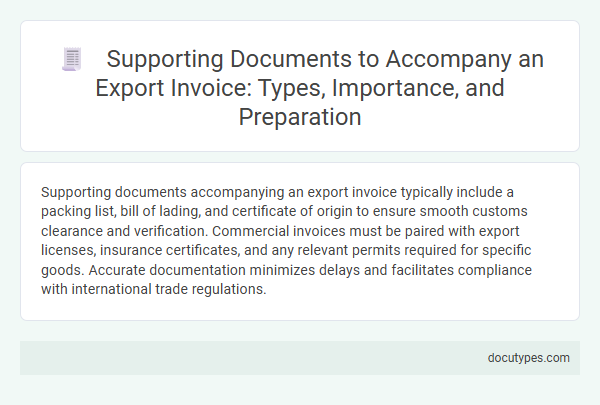Supporting documents accompanying an export invoice typically include a packing list, bill of lading, and certificate of origin to ensure smooth customs clearance and verification. Commercial invoices must be paired with export licenses, insurance certificates, and any relevant permits required for specific goods. Accurate documentation minimizes delays and facilitates compliance with international trade regulations.
Introduction to Export Invoice Supporting Documents
| Introduction to Export Invoice Supporting Documents |
|---|
| An export invoice is a crucial document in international trade, detailing the transaction between the exporter and importer. Supporting documents accompanying the export invoice validate the shipment, product details, and compliance with trade regulations. These may include the bill of lading, certificate of origin, packing list, insurance certificate, and customs declaration forms. Such documents ensure smooth customs clearance, accurate duty assessment, and timely payment processing. Understanding which supporting documents to attach with your export invoice helps prevent delays and legal issues during shipment. Proper documentation strengthens your export operations and builds trust with international clients. |
Why Supporting Documents Matter in International Trade
Supporting documents are crucial for validating the details on an export invoice, ensuring compliance with international trade regulations. These documents facilitate customs clearance, reduce delays, and prevent disputes by providing proof of shipment, product origin, and transaction terms. Your attention to including accurate supporting documents protects your business from legal issues and smooths the export process.
Common Types of Supporting Documents for Export Invoices
Supporting documents are essential for a complete export invoice. They verify the shipment details and facilitate smooth customs clearance.
Common types of supporting documents for export invoices include the bill of lading, packing list, and commercial invoice. Certificates of origin and export licenses may also be required based on the product and destination. Your export shipment is more likely to avoid delays when all necessary documents accompany the invoice.
Commercial Invoice: Core Document Details
What supporting documents should accompany an export invoice to ensure smooth customs clearance? A commercial invoice serves as the core document containing essential transaction details, including buyer and seller information, description of goods, and payment terms. You must include accurate commercial invoice details to facilitate verification and prevent shipment delays.
Packing List: Content and Preparation Guidelines
The packing list is a crucial supporting document that complements an export invoice by detailing the contents of each shipment package. Proper preparation and accurate content description in the packing list ensure smooth customs clearance and efficient inventory management.
- Detailed Content Description - The packing list must specify the exact quantity, weight, and dimensions of each item in the shipment for accurate verification.
- Clear Package Identification - Each package should be clearly numbered and described to match the invoice and facilitate tracking during transportation.
- Compliance with Export Regulations - The packing list should adhere to the importing country's documentation requirements to avoid delays or penalties during customs inspection.
Bill of Lading and Other Transport Documents
Supporting documents play a crucial role in validating the details on your export invoice. Among these, the Bill of Lading stands out as a primary document confirming shipment and ownership of goods.
The Bill of Lading serves as proof of contract between the shipper and carrier, detailing the type, quantity, and destination of the cargo. Other transport documents such as air waybills, delivery receipts, and packing lists further support the export process by providing essential shipment information.
Certificate of Origin: Purpose and Requirements
The Certificate of Origin is a crucial document that verifies the country where the exported goods were manufactured. It serves as proof for customs authorities to determine applicable tariffs and trade agreements.
This certificate must include detailed information such as the exporter's details, product description, and the country of origin. Accurate completion is essential to avoid delays or penalties during customs clearance.
Export Licenses and Permits Essentials
Export invoices must be accompanied by essential supporting documents to ensure compliance with international trade regulations. Export licenses and permits play a crucial role in validating the shipment of goods across borders.
- Export Licenses - Required government-issued documents authorize the export of restricted goods to specific countries.
- Import Permits - These documents confirm the receiver's eligibility to import the goods in the destination country.
- Compliance Certificates - Certificates verifying adherence to trade regulations prevent shipment delays and legal issues.
Providing complete export licenses and permits with the invoice streamlines customs clearance and mitigates the risk of shipment rejection.
Quality and Inspection Certificates Overview
Supporting documents are crucial for validating the details on your export invoice and ensuring smooth customs clearance. Quality and inspection certificates confirm that products meet the required standards and specifications.
- Quality Certificates - These documents verify that the exported goods comply with industry standards and contractual quality requirements.
- Inspection Certificates - Issued by third-party inspectors, these certificates confirm that the products have been examined and meet specified criteria before shipment.
- Compliance Documentation - Supporting papers such as lab test reports or product conformity certificates demonstrate adherence to regulatory and safety standards.
What Supporting Documents Should Accompany an Export Invoice? Infographic

